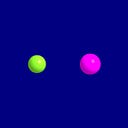Why the dipole moment of CH3F is less than CH3Cl although ‘F’ is more electronegative than ‘Cl’ ?
Fluorine is more electronegative than chlorine . So, the polarity of C –F bond is greater than C– Cl bond. Thus, the dipole moment of CH3F should be higher than CH3Cl .
But the dipole moment of CH3F and CH3Cl is reversed order, that is, the dipole moment of CH3F is slightly less than that of CH3Cl .
Now , the dipole moment is a measure of charge x distance. Although the extent of negative charge on ‘F’-atom is much more than ‘Cl’-atom , yet the dipole moment of CH3F is less than CH3Cl , because the C –Cl bond length is larger than C — F bond length .
So, in case of CH3F ,the multiplication of charge and C –F bond distance is less than the multiplication of charge and C –Cl bond distance .
Why the dipole moment of chloro benzene is less than cyclo hexyl chloride ?
The dipole moment of chloro benzene is less than cyclohexyl chloride because the moment due to resonance of lone pair on Cl-atom , which partially neutralized the actual dipole moment of chloro benzene .
As a result of this the resultant dipole moment of chloro benzene is less than expected value .
On the other hand , in cyclohexyl chloride no such type of resonance takes place and hence a strong dipole moment acts towards the electronegative Cl-atom.
Consequently, The dipole moment of chloro benzene is less than cyclohexyl chloride .
Why the dipole moment of ethyl chloride is greater than vinyl chloride ?
The dipole moment of ethyl chloride is greater than vinyl chloride, because in vinyl chloride the moment due to resonance of lone pair on chlorine atom act in opposite
direction of electronegative Cl-atom , which partially neutralized the actual dipole moment of vinyl chloride molecule and hence the experimental value of dipole moment slightly less than expected value .
But in ethyl chloride molecule , due to electronegativity of Cl –atom , a strong dipole moment acts towards Cl-atom.
Consequently, the dipole moment of ethyl chloride is greater than vinyl chloride .
Summary :
